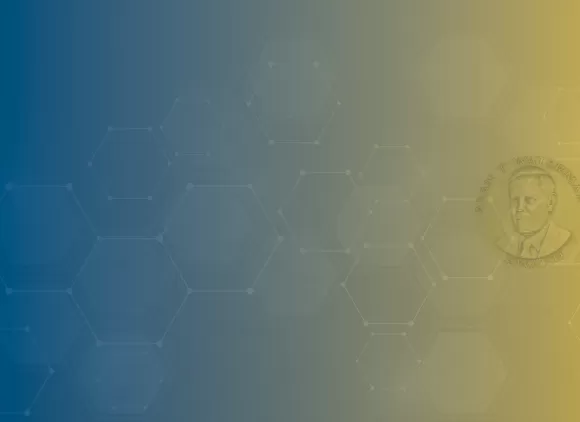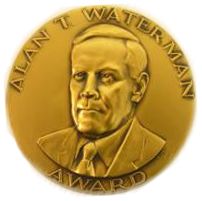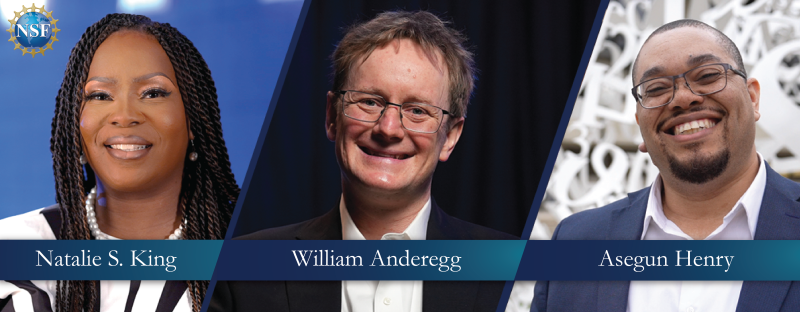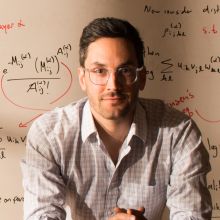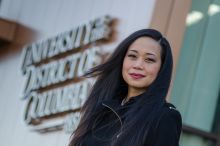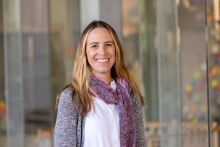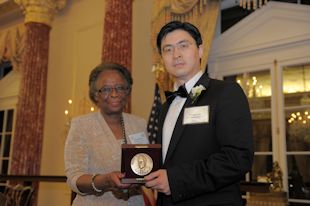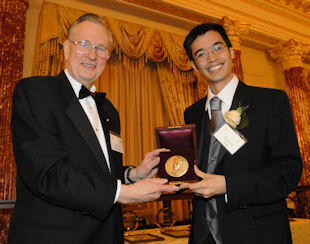Events and videos
Upcoming lectures
We are very excited to share an upcoming lecture series from our 2023 Alan T. Waterman awardees.
Thursday, August 31, 2023, 1:00 p.m. – 2:00 p.m.
Alan T. Waterman Awardee Lecture: Asegun Henry, Ph.D.
Rethinking Problems in Thermal Science and Engineering: From Atoms to Applications
Thursday, September 14, 2023, 1:00 p.m. – 2:00 p.m.
Alan T. Waterman Awardee Lecture: William Anderegg, Ph.D.
The Future of Earth's Forests in a Rapidly Changing Climate
Thursday, September 28, 2023, 1:00 p.m. – 2:00 p.m.
Alan T. Waterman Awardee Lecture: Natalie S. King, Ph.D.
Show them who you are – uninterrupted: Radical possibilities for fostering identity and community in STEM Education
Overview
The Alan T. Waterman Award recognizes an outstanding young researcher in any field of science or engineering supported by the U.S. National Science Foundation.
The annual award is the nation's highest honor for early-career scientists and engineers. In addition to a medal, the awardee receives a grant of $1,000,000 over a five-year period for scientific research or advanced study in the science and engineering disciplines supported by the National Science Foundation at the institution of their choice. Disciplines supported by the NSF include the biological sciences, computer and information science and engineering, engineering, geosciences, mathematical and physical sciences, social, behavioral and economic sciences, and research on STEM education.
Congress established the award in August 1975 to mark NSF's 25th anniversary and to honor the agency's first director.
News
NSF recognizes 3 scientists with the Alan T. Waterman award
The 2023 Alan T. Waterman Award recipients are Natalie S. King, a science educator at Georgia State University; William Anderegg, a biologist from the University of Utah; and Asegun Henry, a Massachusetts Institute of Technology mechanical engineer.
- Natalie S. King is recognized “for groundbreaking scholarship in science, technology, engineering and mathematics education that transcends disciplinary boundaries and directly impacts local and global communities, and for demonstrating exceptional research achievements with tremendous impact on the advancement of Black girls in science, the use of research-practice partnerships to drive K-12 instruction, and the increase of STEM teacher diversity.”
- William Anderegg is recognized “for outstanding contributions to climate change science, particularly in advancing the understanding of the sensitivity, vulnerability, and resilience of forest ecosystems to change, and to risk analyses of forest-related climate change solutions to achieve sustainability goals.”
- Asegun Henry is recognized “for significant contributions in new energy technologies and advanced fundamental understanding of heat transfer addressing a broad range of problems that span from the atomic scale (the physics of heat conduction) to the gigawatt scale (grid-level energy storage).”
This is the second year NSF has chosen to honor three researchers with the award, which recognizes outstanding early-career U.S. science or engineering researchers who demonstrate exceptional individual achievements in NSF-supported fields.
Please read NSF's press release for more information and to see videos of the awardees.
Nomination information
NSF seeks nominations for exceptional candidates that represent the diversity of the nation.
Nominations for the 2024 Alan T. Waterman Award have closed. If you would like to begin planning a nomination for next year, please review the Nomination form description, Letter of reference template, and Nominations tips to help you prepare a nomination.
The Nomination tips were created by the Alan T. Waterman Awards Committee to support nominators and reference writers in their efforts to expertly showcase the talents and expertise of nominees.
Additional information can be found in the Frequently asked questions.
Eligibility and selection criteria
NSF seeks nominations that reflect the diversity of the U.S.
- Nominees must:
- Be U.S. citizens or permanent residents.
- Be 40 years of age or younger OR not be more than 10 years beyond receipt of their Ph.D. by December 31st of the year they are nominated.
- Nominees should have demonstrated exceptional individual achievements in scientific or engineering research of sufficient quality, originality, innovation and significant impact on the field to place them at the forefront of their peers.
Alan T. Waterman award committee
Candidates are reviewed by the Alan T. Waterman Award committee once the nomination call has closed. The committee then recommends the most outstanding candidate(s) to NSF's director and the National Science Board.
Terms expire May 31, 2024
Lesia L. Crumpton-Young
President
Texas Southern University
Biography
Myron P. Gutmann
Research Professor
Institute of Behavioral Science
University of Colorado – Boulder
Biography
James F. Kurose
Associate Chancellor of Partnership and Innovation
Distinguished Professor, Information and Computer Sciences
University of Massachusetts - Amherst
Biography
Terms expire May 31, 2025
Ana de Bettencourt-Dias
Susan Magee and Gary Clemons Professor of Chemistry, Foundation Professor
University of Nevada, Reno
Biography
Ann Quiroz Gates
AT&T Distinguished Professor, Computer Science
University of Texas - El Paso
Biography
Gary Hoover
Professor, Executive Director of the Murphy Institute
Tulane University
Biography
Margaret Leinen
Director, Scripps Institution of Oceangraphy
University of California, San Diego
Biography
William Simpson
Professor, Department of Chemistry and Biochemistry
University of Alaska Fairbanks
Biography
Darryl N. Williams
Senior Vice President, Science and Education
The Franklin Institute
Biography
Terms expire May 31, 2026
Dr. Susan Kalisz
Research Professor
University of Tennessee
Biography
Dr. Surya Mallapragada
Associate Vice President for Research
Iowa State University
Biography
Dr. Mary Jo Ondrechen
Professor
Northeastern University
Biography
Dr. Lance C. Pérez
Dean, College of Engineering
Omar H. Heins Professor of Electrical and Computer Engineering
University of Nebraska, Lincoln
Biography
Dr. Enrico Ramirez-Ruiz
Professor
University of California, Santa Cruz
Biography
Yes. The criteria state that the nominee must be 40 years of age or younger by December 31st of the year of nomination OR within 10 years of receiving their Ph.D. by December 31st of the year of nomination.
A complete nomination includes submission of all requested information through the nomination portal and submission of all four references. The four references must be from individuals who are not from the nominee's home institution. Incomplete nominations will not be reviewed by the committee.
Yes. Please submit no more than the four required reference letters. NSF will not review more than four letters per nomination. Reference letters are limited to two pages each.
Reference letters are welcome from colleagues outside the nominee's home institution. Colleagues at the nominee's institution may not submit reference letters for the nominee.
Yes. You may nominate as many qualified candidates as you would like.
No. Self-nominations are not accepted.
No, the person that enters the nomination cannot also be the nominee. This would be considered a self nomination and self nominations are not allowed.
Because the award includes an extramural federal grant, federal employees are not eligible to be nominees.
Yes. The nominator can be from the nominee’s home institution or another institution.
The nominee can be informed that they are being nominated. Involving the nominee in a conversation around your intention to nominate them may help strengthen the nomination by providing additional insights into their work and suggestions for letter writers.
In general, nominations do not carry over. They will be removed from the portal at the end of the review cycle. Each year, a small number of nominees are shortlisted by the ATW Committee as “top performers”. Nominators of top performers are notified near the time when the nomination portal opens for the following year, so that they have an opportunity to update the nomination, should they wish to do so.
Graduate advisors can be nominators or letter writers (provided that the letter writer is not at the same institution as the nominee). Keep in mind that someone may be nominated up to 10 years after their doctoral degree. It is important to have a nominator and/or letter writers that can speak to the nominee’s professional experience. The contributors to the nomination should have relevant leadership experience in the nominee’s field of research to convey the importance, impact, and context of the nominee’s work within and across their disciplinary fields.
Yes. Letter writers can be from foreign institutions. However, the letters must be written in English.
National Science Foundation staff should not submit nominations or letters of reference.
Past recipients
Inquiries
For further information concerning the Alan T. Waterman Award program or nomination process, email waterman@nsf.gov or contact NSF's Office of Integrative Activities at (703) 292-8040.



